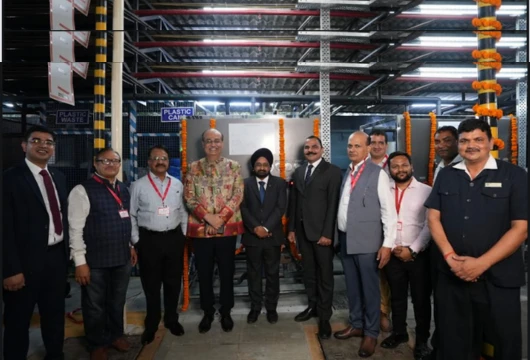The Future of Eco-Luxury
In an extraordinary stride towards sustainable hospitality, the Taj Mahal, New Delhi, a flagship property of the Indian Hotels Company Limited (IHCL), has unveiled an Effluent Treatment Plant (ETP) that redefines green innovation. This advanced system recycles laundry wastewater without chemicals, setting a new precedent in the Indian hospitality sector. The initiative exemplifies the hotel’s commitment to eco-luxury and resource conservation under IHCL’s Paathya framework, which focuses on environmental sustainability, social responsibility, and inclusive growth.
Revolutionizing Water Recycling with Chemical-Free Technology
The state-of-the-art ETP installed at Taj Mahal, New Delhi, recycles 60 kiloliters of wastewater daily, equivalent to the daily water requirements of 5,000 people. Designed to operate without chemicals, the facility has been rigorously tested by IIT-Delhi and complies with IS:10500-2012 standards, ensuring safe and efficient water reuse.
This revolutionary system reduces reliance on freshwater resources while maintaining the highest standards of hygiene and sustainability. The recycled water is redirected to laundry operations, marking a significant step toward resource optimization and environmental stewardship.
Dr. Anmol Ahluwalia, Area Director of Operations and General Manager of Taj Mahal, New Delhi, stated, “This initiative represents a milestone in our journey toward sustainable luxury. As India’s first hotel to adopt chemical-free wastewater recycling, we are proud to inspire the industry and contribute to a greener future.”
Spearheading Green Practices in Hospitality
The project was formally inaugurated by Dr. Anmol Ahluwalia and Mr. Darashbir Singh, Vice President of IHCL Engineering, alongside Mr. Deepak Sharma, Cluster Chief Engineer – New Delhi Area, who spearheaded the initiative. This innovative system is part of IHCL’s broader vision to centralize sustainable laundry operations across its properties.
IHCL’s Paathya framework underpins this vision, prioritizing environmental preservation while delivering exceptional guest experiences. The Taj Mahal, New Delhi, exemplifies how luxury and ecological responsibility coexist harmoniously by integrating cutting-edge technology with a sustainable ethos.
A Step Forward in Sustainable Luxury
Taj Mahal, New Delhi’s wastewater recycling system, addresses a critical challenge in urban water management. With water scarcity becoming an increasing concern globally, this initiative highlights the importance of proactive measures to conserve and recycle water.
Using chemical-free technology ensures minimal environmental impact, reducing water wastage and preserving natural ecosystems. It also sets a compelling example for other players in the hospitality industry to adopt sustainable practices, aligning with global climate action goals.
Impact Beyond the Hotel
The ripple effects of this initiative extend beyond the confines of Taj Mahal, New Delhi. By saving freshwater equivalent to the needs of thousands of individuals daily, the hotel contributes to community water conservation. Moreover, it encourages innovation within the hospitality sector, fostering a culture of environmental accountability.
IHCL’s dedication to sustainability is evident in its other green initiatives, from implementing renewable energy solutions to reducing single-use plastics across its properties. The chemical-free ETP is the latest addition to this impressive portfolio, showcasing IHCL’s leadership in green hospitality.
Aligning with Global Sustainability Goals
This groundbreaking project aligns with India’s commitment to the United Nations Sustainable Development Goals (SDGs), particularly those focused on clean water (Goal 6) and climate action (Goal 13). By adopting advanced water recycling technologies, IHCL and Taj Mahal, New Delhi, contribute to a more sustainable future, emphasizing the urgent need for responsible water management.
Furthermore, the initiative supports the Indian government’s Jal Shakti Abhiyan, which seeks to address water scarcity through conservation and sustainable practices.
As the hospitality industry evolves, the demand for sustainable practices is increasing. Guests today seek not just comfort and luxury but also environmental consciousness. By prioritizing sustainability, the Taj Mahal, New Delhi, redefines eco-luxury, ensuring guests enjoy world-class services while minimizing their ecological footprint.
This initiative is a powerful example of how innovation can be harnessed to address environmental challenges. By leading purposefully, the Taj Mahal, New Delhi, inspires the industry to reimagine luxury through a green lens.
A New Era for Hospitality
Taj Mahal, New Delhi’s chemical-free water recycling system, is more than an operational upgrade—it is a declaration of intent. It underscores the importance of sustainability in modern hospitality and sets a benchmark for others to follow.
With initiatives like this, IHCL demonstrates that eco-luxury is not just a possibility but a necessity. By aligning operational excellence with environmental responsibility, the Taj Mahal, New Delhi, paves the way for a greener, more sustainable future for hospitality in India and beyond.
For more in-depth analysis and inspiring climate news, click here.

